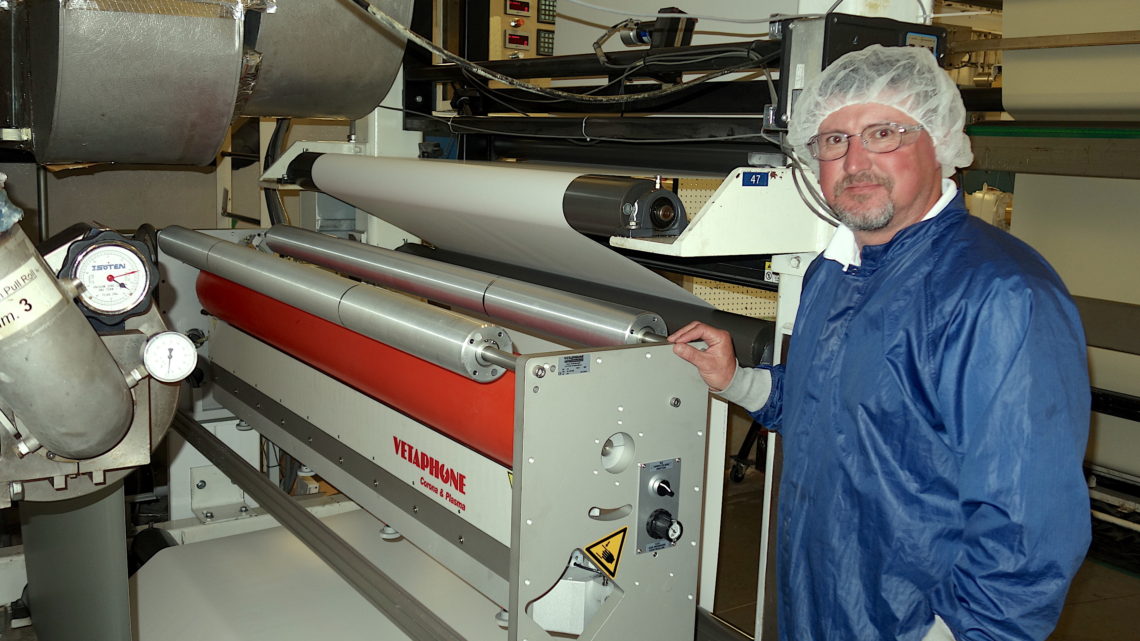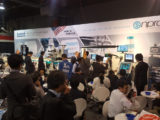
Vetaphone versatility opens new markets for Coveris
November 6, 2018Coveris Americas (formerly Coveris Advanced Coatings) has installed Vetaphone corona systems at its manufacturing plant in Matthews NC as part of a strategic plan to standardise production with its sister company in the UK. Speaking for Coveris, Stephen Barnette, Production Manager at the Matthews facility commented: “We have four Vetaphone units in the UK, the first being installed in 2005, and our British colleagues were instrumental in helping us to standardise corona capability here in the US as more work switches over to balance capacity.”
The company specialises in the development and manufacture of precision coated papers, films and special substrates for the electronics, medical, and optical industries. In addition to the US and UK plants, Coveris has a facility in Guangzhou, China. Services include toll coating and the production of medical components, marketed under the brand name ‘Inspire’, hard-coated films (Reflex), optical adhesive films (Strat-fix) and electronic films (Tecnilith). As Stephen Barnette put it: “Our products touch everybody’s daily life, without them even knowing it!”
Production at the Matthews facility has run 24/7 since the start of 2018, but such is the efficiency of the plant under Barnette’s innovative ‘Coating Wheel’ concept of production, which saves one week in 13, that the plant has dropped back to a 24/5 schedule. The ‘Coating Wheel’ concept is based on ‘intelligent’ scheduling that gives sequential production with minimal changeovers. The benefits are better inventory control and batch production using accurate demand forecasts. “We run with only one pass here, unlike the UK machines that need two passes, but it does mean we require a high level of control,” he said, explaining that the 1520mm Vetaphone unit installed on Machine 127 in 2011 is a low-power VE1C model with single snap-in electrodes, and an iCorona 2kW generator.
The controllability of this Vetaphone unit offers Coveris consistent quality even on low power and gave a green light to the installation of a Vetaphone system for Machine No 133, only this time it required both low and high-power capability. The second system was another VE1C, with a 1920mm width, but this time powered by 6kW iCorona generator. It runs typically at 50 – 90 ft/min, and again offers the high level of control that Coveris needs.
Speaking for Vetaphone, Area Sales Manager for the US, Ted Wolski, commented: “Coveris was a challenge because of the power treatment requirements at both the high and low end. They wanted a system that could run low power, like their previous model, but they also wanted to treat a special material with an exceptionally high factor of 23.3 W*min/ft² (251 W*min/m²). To accomplish this required a 6kW system containing both high power cartridge with five metal electrodes, and a lower power cartridge containing a single aluminium electrode. We combined this with our Dynamic Low Power adapter (DLP) and were able to hit both ends of the spectrum with just the one treater.”
Barnette supported this by adding: “We have enjoyed good on-site training and after-sales support from Vetaphone, but most of all we are working with a supplier that provides a service not just a product. We are all very busy and under time pressure, so to have a company like Vetaphone that smoothed installation and even organised the UL accreditation, was real bonus, and speaks volumes for their commitment to the US market.” Of the seven production lines at the Matthews plant, two are now equipped with Vetaphone corona treaters, and as part of their commitment to customer support, Vetaphone has also supplied a package of spare parts for wear items, even though these can be quickly sourced from Vetaphone’s US service unit in Wisconsin.
With the US plant currently operating at around 60% capacity, compared with 98% in the UK, it is easy to see where the growth will be generated as Coveris moves into the automotive market, with a new product for paint protection, and into portable power sources with the new generation of batteries that recharge quicker without heat or power reserve degradation. The company’s business in the medical sector is also forecasted to stay strong and increase. Currently, output at the Matthews plant is 40% branded goods and 60% non-branded.
As demand continues to evolve and new substrates enter the market, Coveris sees a great opportunity for using its specialist expertise, and already undertakes a quantity of qualification work to prove materials for its customers. The fine control offered by Vetaphone corona technology will play an important part in helping the company to diversify into new and profitable markets.

